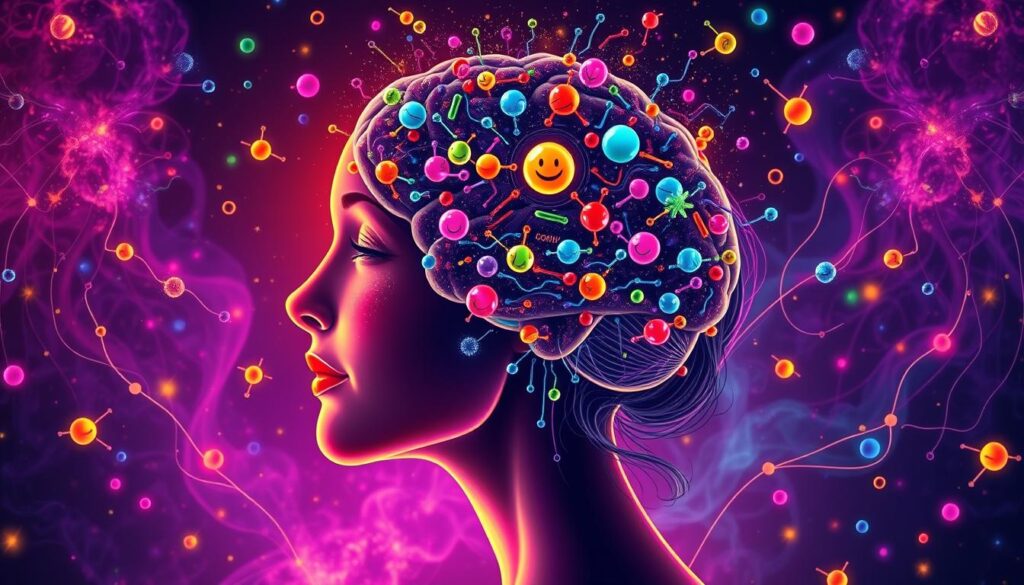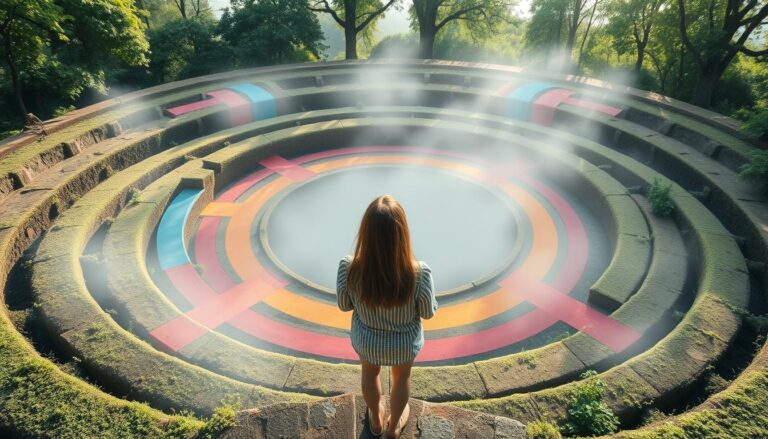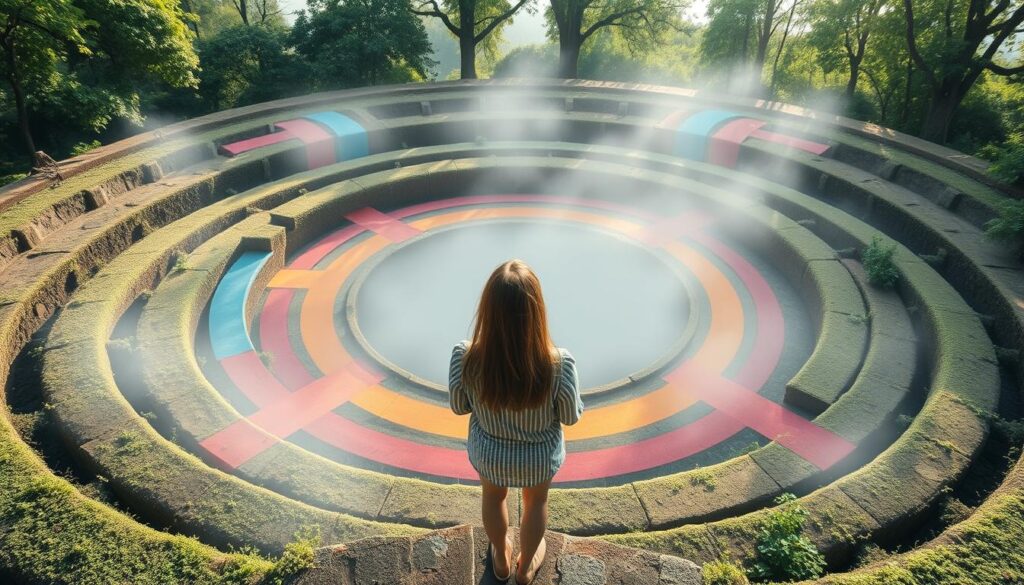Have you ever felt pure bliss, only to see it fade quickly? The fleeting joy can be thrilling yet also frustrating. We all yearn to hold onto those moments of happiness longer. In this article, we’ll dive into why happiness is short-lived and how to keep it around longer.
We’ve all had those moments of pure joy. Like feeling great after achieving something, laughing with loved ones, or enjoying a peaceful moment in nature. These moments are precious but often leave us wanting more. Why does happiness seem to vanish so fast, and how can we enjoy it longer?
By understanding how our brains, psychology, and lifestyle interact, we can find ways to keep happiness around. We’ll explore how to practice gratitude and create lasting experiences. This article will give you the tools to turn fleeting joy into lasting happiness.
Key Takeaways
- Happiness often feels short-lived due to the science behind brain chemistry and psychological factors
- Hedonic adaptation can cause a diminishing return on positive experiences over time
- The modern lifestyle, with its constant stimuli and distractions, can contribute to the impermanence of happiness
- Mindfulness practices, gratitude, and cultivating meaningful social connections can help extend moments of joy
- Creating lasting memories and savoring positive experiences are key to sustaining happiness
Understanding the Science Behind Fleeting Joy
Ever wondered why happiness seems to vanish quickly? The science behind our emotions offers deep insights into our brain’s workings. We’ll explore how neurotransmitters shape our joy and mood.
The Role of Brain Chemistry in Happiness
Our brain’s network of neurotransmitters is key to our emotions, including happiness. Chemicals like serotonin, dopamine, and endorphins send signals between neurons. They affect our mental state and well-being.
How Neurotransmitters Influence Our Mood
Activities that make us happy trigger a dopamine release. This “feel-good” chemical is linked to rewarding experiences. It’s what makes enjoying a meal or reaching a goal so satisfying.
Yet, these neurotransmitters’ effects fade fast. Our brain adapts quickly, reducing the pleasure we feel. This is called hedonic adaptation, a major reason happiness is short-lived.
The Impact of Dopamine on Pleasure Perception
Dopamine is vital for feeling pleasure and reward. Joyful activities release dopamine, making us feel euphoric. But, as we keep experiencing these moments, our brain gets less responsive to dopamine. This leads to a decrease in our positive feelings.
Grasping the brain chemistry behind our emotions helps us understand fleeting happiness. It also offers clues for lasting fulfillment.

Why Happiness Feels Short: The Psychology of Transient Emotions
Have you ever felt like happiness is just out of reach? It’s like a brief moment that slips away. The psychology behind this is really interesting. Our emotions are shaped by many factors, and knowing these can help us find lasting joy.
Emotional regulation is key. It’s about managing our feelings well. People who are good at this tend to feel happy for longer. They learn to enjoy and hold onto happiness, not letting it slip away.
Cognitive biases also affect how we see happiness. Our brains often focus more on the negative. This is called the “negativity bias.” It makes us remember bad times more than good ones.
Our expectations about happiness matter too. If we think happiness should always be there, we might feel let down when it’s not. Learning to accept the ups and downs of emotions can help us find peace in the journey, not just the end goal.
By understanding why happiness feels short, we can find ways to keep it longer. Mindfulness, cognitive-behavioral techniques, and being grateful are just a few strategies. These can help make happiness feel like a real, lasting place, not just a dream.
The Hidden Impact of Hedonic Adaptation on Our Well-being
Humans have a unique ability to adapt to life’s changes, both good and bad. This is called hedonic adaptation. It affects our happiness and well-being. Knowing how it works is key to keeping joy and fulfillment alive.
Breaking the Cycle of Diminishing Returns
Hedonic adaptation includes the idea of diminishing returns. When we get something good or experience a positive event, we feel happy at first. But soon, our brains get used to it, and the happiness fades. This makes it hard to keep feeling happy for a long time.
Recognizing Adaptation Patterns
- Find out where you quickly adapt, like with new things or achievements.
- Notice how your happiness changes over time with these positive events.
- Pay attention to when you start to feel less excited about something new.
Strategies to Counter Habituation
- Focus on the moment and enjoy it fully, without taking it for granted.
- Try new things and face new challenges to keep life exciting.
- Be thankful for the good things in your life, no matter how small.
- Change your routine and try new activities to avoid getting too used to things.
By understanding hedonic adaptation and using these strategies, we can overcome the limits of diminishing returns. This opens up a lasting path to happiness and well-being.
| Hedonic Adaptation | Diminishing Returns of Happiness | Habituation |
|---|---|---|
| The phenomenon where people quickly adapt to positive changes in their lives, leading to a gradual decline in the intensity of their happiness. | The concept that the more we experience a positive event or acquire a new possession, the less enjoyment we derive from it over time. | The process by which we become desensitized to a stimulus, reducing its impact on our emotional and physiological responses. |
The Modern Lifestyle's Effect on Happiness Duration
In today’s fast world, our lifestyle affects how long we feel happy. We deal with constant connection, too much info, and work stress. It’s key to see how these things change our joy and well-being.
Our busy lives keep us always on the go. This makes it hard to enjoy the good times fully. The stress of our world messes with our balance between work and life. This leaves us feeling too much and unable to live in the moment.
- Being always connected and having too much info makes it hard to focus on what makes us happy.
- Work stress and always being “on” can make us burn out. This hurts our happiness.
- Our drive for more in our lifestyle can make us forget the value of self-care and real connections.
To fight the negative effects of our lifestyle on happiness, we need to be mindful with tech. We must find a good balance between work and life. And we should focus on our emotional health. By doing these things, we can find lasting joy.
Understanding Our Happiness Setpoint
Ever wondered why some people seem happier than others, even when they face the same life events? The idea of a “happiness setpoint” gives us clues about this mystery.
Genetic Factors in Happiness Perception
Research shows our genes affect our baseline happiness. Certain genes and brain paths shape how we feel about good and bad things. These genetic factors explain why happiness varies among people.
Environmental Influences on Joy
Genetics aren’t the only thing that matters. Our surroundings and life events also shape our happiness. Things like where we grew up, our money status, and our relationships can affect our long-term happiness. Knowing how these factors impact us is key to feeling better.
Reshaping Our Happiness Baseline
We can change our happiness setpoint, even with our genes and environment. By practicing mindfulness, being thankful, and building strong relationships, we can boost our happiness. These actions can help us feel more joyful over time.
Learning about our happiness setpoint helps us take charge of our happiness. By understanding how genes, environment, and our choices interact, we can find lasting joy and fulfillment.
Mindfulness Practices for Lasting Happiness
In today’s fast world, finding lasting happiness is tough. But mindfulness can help. It teaches us to enjoy the moment and feel well-being longer.
Mindfulness means being fully in the present, without judgment. It’s simple yet powerful. It can make us happier and more satisfied with life. Let’s look at some key practices for lasting happiness.
Meditation: The Gateway to Presence
Meditation is a well-known mindfulness practice. It involves focused breathing and mental calm. Regular meditation can lower stress, boost mood, and improve well-being.
Present Moment Awareness
We can also practice mindfulness in daily life. It’s about paying attention to now, not the past or future. This way, we notice and enjoy life’s small pleasures.
- Take a mindful pause throughout the day to focus on your breathing or the feel of your feet on the ground.
- Engage your senses by noticing the colors, textures, and scents around you.
- Practice being fully present during everyday activities, such as eating, walking, or conversing with others.
Mindfulness practices help us stay in the present. This is where true happiness and fulfillment are. With practice, we can enjoy positive moments longer and feel well-being more deeply.
Cultivating Gratitude as a Path to Sustainable Joy
Gratitude is a powerful tool for lasting happiness. By focusing on what we appreciate, we can find true well-being. We’ll look at daily rituals, the science behind gratitude, and how a gratitude network can bring lasting joy.
Daily Gratitude Rituals
Starting each day with gratitude can change our mood and outlook. Simple acts like journaling, thanking loved ones, or enjoying nature can shift our focus. Making gratitude a daily habit helps us appreciate the small joys we often miss.
The Science of Appreciation
Gratitude does more than make us feel good; it improves our health and happiness. Studies show it lowers stress, boosts serotonin, and strengthens our immune system. Cultivating gratitude can give us purpose, resilience, and life satisfaction.
Building a Gratitude Network
Being around people who appreciate life can enhance our gratitude. Sharing our thanks and encouraging others creates a positive cycle. This strengthens our bonds and helps us face life’s challenges with hope and optimism.
Living a life filled with gratitude leads to lasting joy. By incorporating daily rituals, understanding the science, and connecting with others, we can find deep fulfillment. This fulfillment goes beyond short-lived happiness.
| Daily Gratitude Rituals | The Science of Appreciation | Building a Gratitude Network |
|---|---|---|
|
|
|
Social Connections and Durable Fulfillment
We often forget how much our social connections and relationships affect our happiness. Building strong bonds with others brings joy and lasting fulfillment. It’s a key part of a happy life.
Research shows that people with strong social networks are happier and more resilient. Meaningful connections help us deal with life’s challenges and find lasting happiness.
The Power of Relationships
Our relationships, with family, friends, or community, are key to happiness. Investing in these connections creates a support system. This gives us a sense of belonging and security, vital for lasting happiness.
The Benefits of Community Engagement
Getting involved in our community, through volunteering or joining clubs, boosts happiness. It gives us a sense of purpose and belonging. Plus, it makes our lives richer with meaningful experiences.
| Benefits of Social Connections | Benefits of Community Engagement |
|---|---|
|
|
By focusing on social connections and community engagement, we build lasting happiness. This approach to well-being leads to a life filled with joy and contentment.
Creating Meaningful Experiences That Last
We all want experiences that change our lives. Moments that stay with us and make us happy long after. We’ll look into how memories are made, how to make experiences unforgettable, and how to enjoy the good times more.
The Power of Memory Formation
Memories are key to our happiness. Knowing how our brains keep important moments in mind helps us make experiences count more. Studies show that strong emotions, whether happy or sad, help us remember better.
By adding meaning and feeling to our experiences, we make memories that keep us happy for a long time.
Designing Peak Experiences
Making unforgettable experiences takes planning. It could be a dream trip, a big celebration, or time for personal growth. We can plan “peak experiences” that make a big impact.
By thinking about what makes moments special, like being new or challenging, we can create unforgettable moments. These moments inspire us to have more of them in the future.
Savoring Positive Moments
Even small joys can be deep if we learn to enjoy them. By focusing on the present, we can appreciate and enjoy good moments more. Techniques like being mindful, taking mental photos, and sharing with others help us enjoy the happiness of meaningful experiences longer.
FAQ
Why does happiness often feel so short and fleeting?
Happiness can feel short because of our brain chemistry and how we feel pleasure. We get used to good things in our lives quickly. This makes happiness fade over time. Also, our emotions, thoughts, and what we expect can make happiness seem short.
How does hedonic adaptation impact our overall well-being?
Hedonic adaptation means we quickly go back to feeling normal, even after big changes. This can make us need more to feel happy. Knowing about this can help us stay happy longer.
What role does our modern lifestyle play in the impermanence of happiness?
Our busy lives, always being connected, and stress at work can make happiness short. It’s hard to enjoy good moments in today’s fast world. Finding a balance and being careful with technology can help us enjoy happiness more.
How can we reshape our baseline level of happiness?
Our happiness level is shaped by genes and our environment. We can’t change our DNA, but we can change our happiness through habits and lifestyle. Gratitude, mindfulness, good relationships, and meaningful experiences can help.
What mindfulness practices can help extend our happiness?
Mindfulness, like meditation, can make happiness last longer. It helps us enjoy good moments and feel better when we’re not. Being present can make our happiness last longer.
How can cultivating gratitude contribute to sustainable happiness?
Gratitude is key to lasting happiness. Daily rituals, like journaling or sharing thanks, focus on the good in our lives. This boosts our well-being and makes happiness last.
What role do social connections play in durable fulfillment?
Good relationships and feeling part of a community are essential for lasting happiness. They give us support and a sense of belonging. Investing in our social bonds makes happiness more lasting.
How can we create meaningful experiences that leave a lasting impact?
Creating memorable experiences is important for lasting happiness. Understanding how we remember things and focusing on the joy in our lives can help. This way, we can enjoy happiness for longer.















